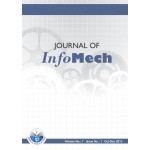The Editorial Board consists of eminent
personalities from various Institutions and Industries of repute, undoubtedly
helping both the mechanical student communities and faculties alike.
The aim of publishing the Journal is to provide a national
and international forum for the publication and dissemination of original work
that contributes to understanding the primary and related disciplines of
mechanical engineering. The Journal covers the whole spectrum of mechanical
engineering, including Design Engineering, Production Engineering, Thermal
Engineering, and interdisciplinary subjects.
Manuscripts may fall into several categories,
including full articles, solicited reviews or commentary, and unsolicited
reviews or analysis related to the core of mechanical engineering. It is also
proposed to maintain forthcoming events in the field of mechanical
engineering.
Research Documentation:
It is important that the authors record the results of their research in a form that its analysis and review could be done before the publication and by other researchers for a reasonable period after publication. Fabrication, like reporting results that were never conducted or deceive or intent to mislead, is a form of scientific misconduct and regarded as highly unethical and in some jurisdictions may be illegal.
Publication Practice:
The authors should submit their research papers in the journal’s précised format for each publication. The information provided by the authors should be concise, authentic and give details of the research experiments performed. Authors should include recent research articles and bring in comparative analysis to support their research. However, in doing so authors should rewrite the information in their own words and represent it in a form that supports their original work of research. This information, used from the work of competitors, other researchers and partners, should be citied as references in the research papers. They should also cite publications that have been influential in determining the nature of the reported work.
Authorship Practice:
Authorship credit should be based on substantial contributions to conception and design, or acquisition of data, or analysis and interpretation of data; drafting the article or revising it critically for important intellectual content; and final approval of the version to be published. A citied author should meet all of these criteria. Individuals that made other contributions to the research like obtaining funds for the research, collecting important data and materials, or co-ordinating with the publication, are significant but do not qualify for authorship. These individuals can be acknowledged in the research papers.
The source of funding for the research project or the
publication of the document should be stated. The author should clearly
declare that the submitted work and its essential substance have not
previously been published and are not being considered for publication
elsewhere. If a primary research report has been published, the author
should clearly state it and also mention the advancement and new
analyses or syntheses of data in the secondary research report. An
overlap of about 10 per cent is considered acceptable between such
journals.
Plagiarism is an unethical practice in the field of research
and is completely unacceptable. Authors are required to state they are
the copyright owners or they have taken the copyright owners’ permission
before submitting the research report. Any breach of copyright is not
acceptable. Besides journals, FCS also publishes Conference Proceedings
for a no fee. These are intended to serve the community as a means of
sharing the most recent work-in-progress in respective areas of
research. Conference organizers have to declare that the proceedings
will not be shared with or published in any other journal.
Editorial Responsibilities:
The editor of a journal has a complete authority and responsibility to accept or reject a submitted paper and is not influenced by the management or owners in any form. The editor may confer with associate editor, co-editors and peer-reviewers while making a decision. The editors should judge all submissions on their scientific merit and minimize the influence of other factors. The decision should be timely and fair irrespective of caste, culture, origin, gender or citizenship of the author. Editors, authors, and peer reviewers have a responsibility to disclose interests that might appear to affect their ability to present or review data objectively. These include relevant financial, personal, political, intellectual, or religious interests. Editors and board members should, whenever these are relevant to the content being considered or published, declare their interests and affiliations. The editorial team should not disclose any information about a submitted paper under consideration other than to reviewers. Situations that may lead to conflicts of interest should be avoided.
Research Documentation:
It is important that the authors record the results of their research in a form that its analysis and review could be done before the publication and by other researchers for a reasonable period after publication. Fabrication, like reporting results that were never conducted or deceive or intent to mislead, is a form of scientific misconduct and regarded as highly unethical and in some jurisdictions may be illegal.

